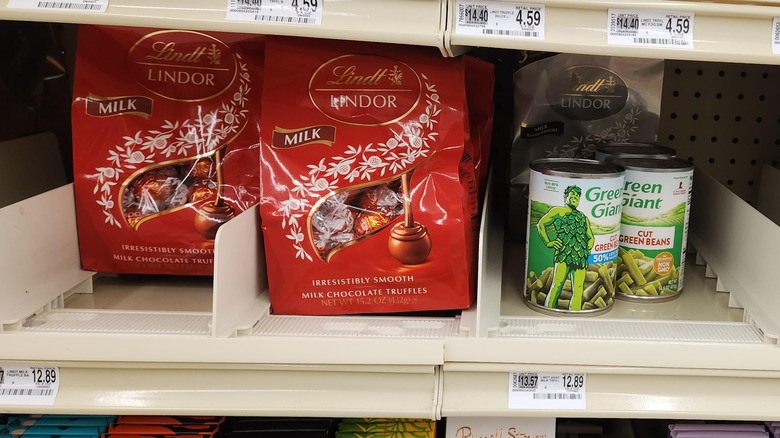Why You Shouldn't Put Misplaced Groceries Back Where They Belong
You're at the grocery store browsing the breakfast aisle, and right next to the box of cereal you're about to grab, you spot a carton of eggs left behind by another customer. Your first thought might be to go the extra mile and bring them back to where they belong, however, this is actually the last thing you should do. While you might have good intentions, unfortunately, it isn't as helpful as you'd think to other customers or store employees.
The only time you should ever return an item to its original location is if it's coming from your own cart and you simply changed your mind about it. Otherwise, there's no reliable way to tell how long a misplaced item has been sitting out, and that means it could've easily gone bad or reached its expiration date without you realizing it. No customer would knowingly buy chicken that has been sitting in the baking aisle or cheese left amongst boxes of crackers and snacks, so it's best not to restock wayward grocery items.
What to do when you see misplaced items at the grocery store
If you see an item that has clearly been misplaced, the best thing to do is to bring it to a nearby employee. Just let them know where you found it, and they'll take care of the rest. While you have no obligation to do this, it makes a big difference for the workers. After closing time, grocery store employees have to hunt the aisles for any misplaced items, and it can prolong the workday for people who just want to go home.
If there's no employee in sight to hand off the misplaced items, or you're just not in the mood to go out of your way to find one, you can always keep it in your cart separate from your own groceries and pass it off to the cashier when you pay. It's still better than leaving it where you found it or returning the potentially spoiled item on your own.
What do grocery stores do with misplaced products?
You might assume that the employees just collect all the misplaced products around the store and put them back where they belong, but it's a bit more complicated than that. Employees first have to sort the items they find. If a refrigerated item is put in a non-refrigerated section, for example, it gets automatically trashed. The non-perishables do get put back, provided their sell-by date hasn't yet passed. All of this must also be recorded in a log.
Because of all the wasted food and overtime employees have to put in, misplaced groceries are a major cause of profit loss for grocery stores, supermarket assistant Joanne Archer told Insider. This ultimately leads to higher prices and less frequent sales. While the most obvious solution is for customers to be more considerate about where they place their unwanted groceries, handing off any that you come across to an employee goes a long way too.


